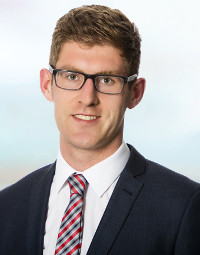Patrick Murphy: Second-ever public hearing by CAS following ECtHR decision

Patrick Murphy
William Fry associate Patrick Murphy and trainee Leeane Grace consider the impact of a recent European court ruling on sports.
On 15 November 2019, the Court of Arbitration for Sport (CAS) hosted a live broadcast of the hearing of Sun Yang, a Chinese swimmer who was accused of refusing or failing to submit a sample for testing.
The hearing was only the second ever public hearing held by CAS and the first public hearing since the decision of the European Court of Human Rights (ECtHR) in the Pechstein case, which established that a public hearing should be available for disciplinary matters.
Pechstein case
Claudia Pechstein, a German professional speed skater, underwent doping control testing prior to competing in the Word Speed Skating Championships in 2009 and was retroactively banned for two years. Pechstein unsuccessfully appealed her ban to CAS and then to the Swiss Federal Supreme Court. She also made an application to the ECtHR alleging, amongst other grounds, that Switzerland had violated her rights under Article 6 of the European Convention of Human Rights (Convention) for failing to grant her a public hearing before CAS.
Jurisdiction of ECtHR to hear cases about CAS decisions
CAS is the emanation of a private-law foundation and is not a state Court nor an institution of Swiss public law. Therefore, at first glance Switzerland would not be subject to liability under the Convention for decisions of CAS.
However, the ECtHR found CAS decisions to be “proper judgments comparable with those of a national Court” because they were made in a judicial manner and could be appealed to the Swiss Federal Supreme Court. As a result, the ECtHR held that Pechstein’s case was capable of engaging Switzerland’s responsibilities under the Convention and so the ECtHR had jurisdiction to hear the case.
The right to a public hearing in CAS
Pechstein had requested for her appeal to CAS to be heard in public. At the time the CAS Code of Sports-related Arbitration (CAS Code) provided that hearings would only be conducted in public with the agreement of all parties, including the CAS panel. In Pechstein’s case, the CAS panel refused to hold the hearing in public.
In assessing whether CAS should conduct its hearings in public, the ECtHR drew attention to the public character of proceedings as being a fundamental principle of Article 6 of the Convention. It outlined that holding proceedings in public protects litigants against justice being administered in secret without public scrutiny and is one of the means whereby confidence in the Courts can be maintained. It also held that this principle can only be derogated from in certain circumstances, for example where there are no issues of credibility or contested facts which would necessitate an oral hearing.
The Court ultimately held that Pechtein’s rights under Article 6 of the Convention had been breached. It held that the question of whether Pechstein was justifiably banned for doping and the hearing of expert testimony in that regard rendered it necessary to a hold a hearing under public scrutiny. In particular, the Court highlighted that the facts were disputed and that the ban imposed on Pechstein carried a degree of stigma and was likely to adversely affect her professional honour and reputation.
Change to the CAS Code
Prior to the Pechstein decision, the only case that had been heard publicly by CAS was the appeal of Ireland’s triple Olympic swimming champion Michelle Smith De Bruin against a four-year ban for tampering with a doping sample in 1999.
Following the Pechstein decision, Rule 57 of the CAS Code was amended to provide for a public hearing for disciplinary hearings where it is requested by one of the parties. In November 2019, the public hearing Chinese swimmer Sun Yang became only the second public hearing of CAS.
What to expect next?
Given the effect a suspension can have on a professional athlete’s career and livelihood, it is likely that professional athletes will increasingly avail of the amended provisions in the CAS Code and request hearings for disciplinary matters before CAS to be conducted in public to ensure their rights are adequately protected.

- Patrick Murphy is an associate and Leeane Grace is a trainee solicitor at William Fry.










